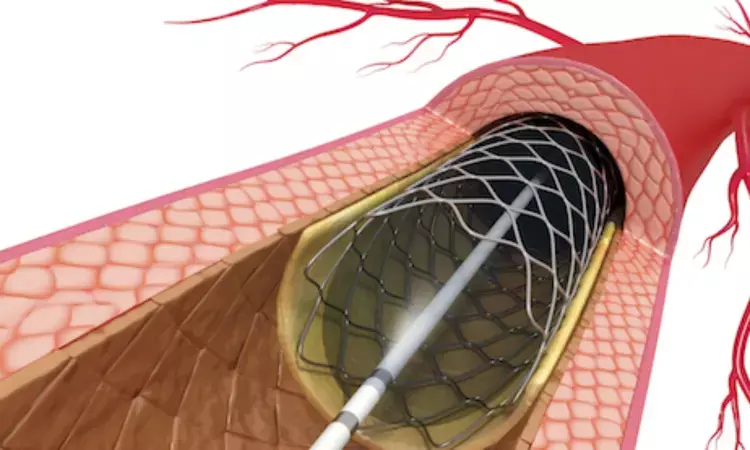- Home
- Medical news & Guidelines
- Anesthesiology
- Cardiology and CTVS
- Critical Care
- Dentistry
- Dermatology
- Diabetes and Endocrinology
- ENT
- Gastroenterology
- Medicine
- Nephrology
- Neurology
- Obstretics-Gynaecology
- Oncology
- Ophthalmology
- Orthopaedics
- Pediatrics-Neonatology
- Psychiatry
- Pulmonology
- Radiology
- Surgery
- Urology
- Laboratory Medicine
- Diet
- Nursing
- Paramedical
- Physiotherapy
- Health news
- Fact Check
- Bone Health Fact Check
- Brain Health Fact Check
- Cancer Related Fact Check
- Child Care Fact Check
- Dental and oral health fact check
- Diabetes and metabolic health fact check
- Diet and Nutrition Fact Check
- Eye and ENT Care Fact Check
- Fitness fact check
- Gut health fact check
- Heart health fact check
- Kidney health fact check
- Medical education fact check
- Men's health fact check
- Respiratory fact check
- Skin and hair care fact check
- Vaccine and Immunization fact check
- Women's health fact check
- AYUSH
- State News
- Andaman and Nicobar Islands
- Andhra Pradesh
- Arunachal Pradesh
- Assam
- Bihar
- Chandigarh
- Chattisgarh
- Dadra and Nagar Haveli
- Daman and Diu
- Delhi
- Goa
- Gujarat
- Haryana
- Himachal Pradesh
- Jammu & Kashmir
- Jharkhand
- Karnataka
- Kerala
- Ladakh
- Lakshadweep
- Madhya Pradesh
- Maharashtra
- Manipur
- Meghalaya
- Mizoram
- Nagaland
- Odisha
- Puducherry
- Punjab
- Rajasthan
- Sikkim
- Tamil Nadu
- Telangana
- Tripura
- Uttar Pradesh
- Uttrakhand
- West Bengal
- Medical Education
- Industry
P2Y12 inhibitor monotherapy scores over continued DAPT after complex PCI: JACC

Italy: Dropping aspirin after 1-3 months of DAPT (dual antiplatelet therapy) among patients undergoing PCI is associated with no increase in ischemic and fatal events and less bleeding versus continuing standard DAPT, regardless of procedural complexity, according to a meta-analysis of randomized trials.
"P2Y12 inhibitor monotherapy after 1-3 months of DAPT was linked with comparable rates of ischemic and fatal events and lower bleeding risk compared with standard DAPT, irrespective of PCI complexity," Felice Gragnano from the University of Campania Luigi Vanvitelli in Caserta, Italy, and colleagues wrote in their study that featured in Journal of the American College of Cardiology.
The study was conducted given the unclarity of whether P2Y12 inhibitor monotherapy protects against ischemic events while limiting the risk of major bleeding compared with DAPT after complex PCI (percutaneous coronary intervention). The research team aimed to examine the effects of P2Y12 inhibitor monotherapy after 1 to 3-month DAPT compared to standard DAPT regarding PCI complexity.
For this purpose, the researchers pooled patient-level data from randomized controlled trials drawing a comparison between P2Y12 inhibitor monotherapy and standard DAPT on outcomes following revascularization. Complex PCI was defined as any of six criteria: ≥3 stents implanted, three vessels treated, bifurcation with two stents implanted, ≥ three lesions treated, chronic total occlusion, or total stent length >60 mm.
All-cause mortality, stroke, and myocardial infarction were assessed (primary efficacy endpoint). The critical safety endpoint was BARC (Bleeding Academic Research Consortium) 3 or 5 bleeding.
The study revealed the following findings:
- Of 22,941 patients undergoing PCI from 5 trials, 20.4% with complex PCI had more excellent rates of ischemic events.
- The primary efficacy endpoint was comparable between DAPT and P2Y12 inhibitor monotherapy among patients with complex PCI (HR: 0.87) and noncomplex PCI (HR: 0.91).
- The treatment effect was consistent across all the parts of the complex PCI definition.
- P2Y12 inhibitor monotherapy consistently lowered BARC 3 or 5 bleeding in patients with complex PCI (HR: 0.51) and noncomplex PCI (HR: 0.49), compared with DAPT.
"The study strongly suggests that a strategy of initial DAPT followed by P2Y12 inhibitor monotherapy prevents ischemic events with a substantially lower bleeding risk," Deepak L. Bhatt from Icahn School of Medicine in New York, NY, wrote in an accompanying editorial.
"The results are consistent with the prior body of published data that revealed that P2Y12 inhibitor monotherapy is more potent than aspirin monotherapy," he wrote.
Reference:
Gragnano F, Mehran R, Branca M, et al. P2Y12 inhibitor monotherapy or dual antiplatelet therapy after complex percutaneous coronary interventions. J Am Coll Cardiol. 2023;81:537-552.
Dr Kamal Kant Kohli-MBBS, DTCD- a chest specialist with more than 30 years of practice and a flair for writing clinical articles, Dr Kamal Kant Kohli joined Medical Dialogues as a Chief Editor of Medical News. Besides writing articles, as an editor, he proofreads and verifies all the medical content published on Medical Dialogues including those coming from journals, studies,medical conferences,guidelines etc. Email: drkohli@medicaldialogues.in. Contact no. 011-43720751


